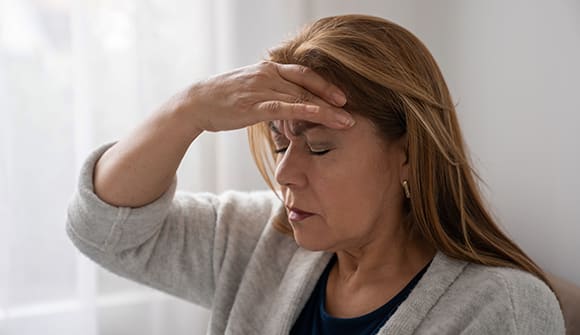Are you at risk for an aneurysm?
Family history or smoking may make you more susceptible.
Article Author: Beth Stambaugh
Article Date:

Baptist Health is currently looking for people diagnosed with or treated for a brain aneurysm and any of their biological first-degree blood relatives (parent, full siblings, children) to join our Familial Brain Aneurysm Study. The study is designed to assess the hereditary probability of brain aneurysms. To view other clinical research studies, click here.
Up to 12 million Americans are walking around with a brain aneurysm and don't even know it. Could you be one of them?
What is a brain aneurysm?
A brain aneurysm is a bulge on the wall of a blood vessel resembling a balloon.
According to the Centers for Disease Control and Prevention, an estimated 40,000 people in the U.S. experience a ruptured aneurysm each year. Just like a heart attack, there is usually no warning that a brain aneurysm might rupture.
A ruptured brain aneurysm can cause stroke, brain damage, coma and even death.
Am I at risk for a brain aneurysm?
The first step is to identify your risks and control what you can. Many factors can be eliminated simply through lifestyle changes. Smoking, alcohol or drug abuse, and high blood pressure can make you more susceptible.
"Early detection can save your life," said Ricardo A. Hanel, MD, PhD, neurosurgeon and co-medical director of the Baptist Health Stroke & Cerebrovascular Center.
A simple, noninvasive imaging test called an MRA can detect if an aneurysm is present. Your primary care doctor can order the test or refer you to a neurologist, if needed.
Aneurysm risk factors
Things that put someone at higher risk for an aneurysm include:
- Smoking
- Age (especially 50+)
- Family history of brain aneurysms
- Sex: Women are more likely than men to have an aneurysm
- Alcohol or drug abuse, particularly cocaine
- High blood pressure
- Fibromuscular dysplasia
- Polycystic kidney disease
You can also use this brain aneurysm risk screening card to help determine your personal risk factors.
Family history of aneurysms
If you have a family member with a brain aneurysm, your risk of having one increases from 4% to 6%. That risk doubles to 8% if you have two family members with an aneurysm.
"Family history is one of the highest predictors of developing an aneurysm," Dr. Hanel said. "If you have a strong history of brain aneurysms in your family, you should consider getting screened right away. Anyone who has two or more relatives with an aneurysm should be checked."
What are the symptoms of an aneurysm?
Over time, a brain aneurysm may grow and press on brain nerves. If this happens, you may experience:
- Sudden or severe headaches
- Pain above or behind the eye
- Blurred or double vision
- Seizures
"If people know they're at risk and can get the right treatment in time, they don't have to die of ruptured brain aneurysms," said Dr. Hanel.
What are the treatments for brain aneurysms?
The good news is that most aneurysms are treatable. Dr. Hanel, along with his colleagues Eric Sauvageau, MD, neurosurgeon and co-medical director of Baptist Stroke & Cerebrovascular Center; Nima Amin Aghaebrahim, MD, neurointerventionalist; and Daniel Ikeda, MD, neurosurgeon, have removed or treated many types of aneurysms with minimally invasive approaches.
"Depending on the size and location, we can treat many aneurysms by going through a blood vessel in the leg and navigating up to the brain," Dr. Hanel said.
Drs. Hanel, Sauvageau, Aghaebrahim and Ikeda employ advanced noninvasive treatments, such as flow diverter technology, in which a braided cylindrical mesh is inserted into the aneurysm to slow the flow of blood and allow the diseased vessel to heal. The doctors can also fill the aneurysm with coils, which causes it to dry up over time.
"Having had an aneurysm also means there is a higher chance you will develop another. If you are at risk, you need to be closely monitored by a skilled professional to prevent another occurrence," Dr. Hanel said.
A ruptured brain aneurysm is a medical emergency
If you or a loved one experiences symptoms, call 911 immediately. If you or someone you know has been diagnosed with an unruptured brain aneurysm, visit baptistjax.com/aneurysm or call 904.388.6518 to learn about treatment options.



